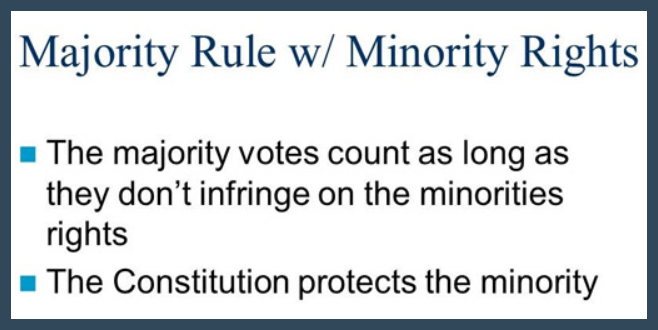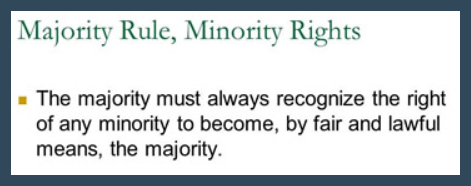Majority Rule and Minority Rights

Unit Overview
In this
unit, students will describe the meaning of majority rule and minority rights
of an American citizen. (CS #15)
Section A: Content Statement 15
Content
Statement 15
Historically,
the United States has struggled with the majority
rule and the extension of minority
rights. As a result of this struggle, the government has increasingly
extended civil rights to marginalized groups and broadened opportunities for
participation.
Content
Elaboration
The U.S. Constitution guarantees rights to
the people of the United States. Historically, despite those guarantees,
various groups of people have been denied the ability to exercise their rights
fully. Over time, the U.S. government has responded to public pressure to take
action to ensure the free exercise of
rights by all people and to protect
their ability to participate in the processes of governing.
For example,
constitutional amendments guaranteed
suffrage to women and eliminated poll taxes as a means of restricting African
Americans from voting. The executive
branch used troops to help integrate schools and brought charges against
violators of open housing legislation. The legislative
branch enacted a series of civil rights acts and voting rights acts. The U.S. Supreme Court, through the process of
incorporation, has used the due process and equal protection clauses in the
14th Amendment to apply most of the federal Bill of Rights to the states.
Section B: Majority Rule
The term "majority rule" can be
defined as the people in a democracy agree to live together in a state
established by a constitution they have created. In doing so, they become "politically
united people" or "political people.
The free consent of the people living under a constitution is
essential for their state to be legitimate.
For a representative democracy to exist, minorities must freely consent to join the majority to form a normal
democratic state. Majorities may not
forcefully include unwilling minorities in establishing a new state and justify
this by the principle of "majority rule." Once everyone agrees
to be a part of a state, can they be legitimately ruled by majorities that must
respect minority rights. The people that make up the government may be
from different ethnic, religious, or racial backgrounds.

When
studying government, it's important to remember the distinction between
majority rule and majority rights. In a democracy, laws are decided for the
most part by a simple majority, 50% plus one vote. But our democracy is also
formed to protect the rights of the minority, whether it be racial, ethnic,
political, or any other group. This is the essence of democracy, and it's
backed up or enforced if you will by our national and state Constitution, even
our local councils and school boards.
The will of
the "majority" group does not always win. The majority votes count as long as they don't
infringe on the minorities' rights. The
Constitution protects the minority.
·
Natural Rights Theory
o No government can justly take away rights that are naturally occurring
o A democratic government cannot take away the rights of a
political minority
Let’s Practice:
True or False
Section C: Minority Rights
"Minority
rights" is any group that does not constitute a majority in a political system. In voting, the majority rules. It would be
possible for the majority to mistreat a minority group. Protecting the rights
of the minority means protecting the rights of small or unpopular groups
regardless of what the majority believes.
Everyone must be treated fairly.
Over time,
the U.S. government has taken actions to ensure the free exercise of rights by
all people and to protect their ability to participate in the processes of
governing. Below are some examples of
those actions.
·
19th Amendment à guaranteed suffrage to all women
·
24th Amendment à eliminated the poll tax
·
Executive branch à uses National Guard to help integrate schools
·
Legislative branch à enacted a series of civil rights acts and voting rights acts
·
Supreme Court à used the due process clause of the 14th Amendment to
apply to Bill of Rights to the states
Let’s Practice: Government Action